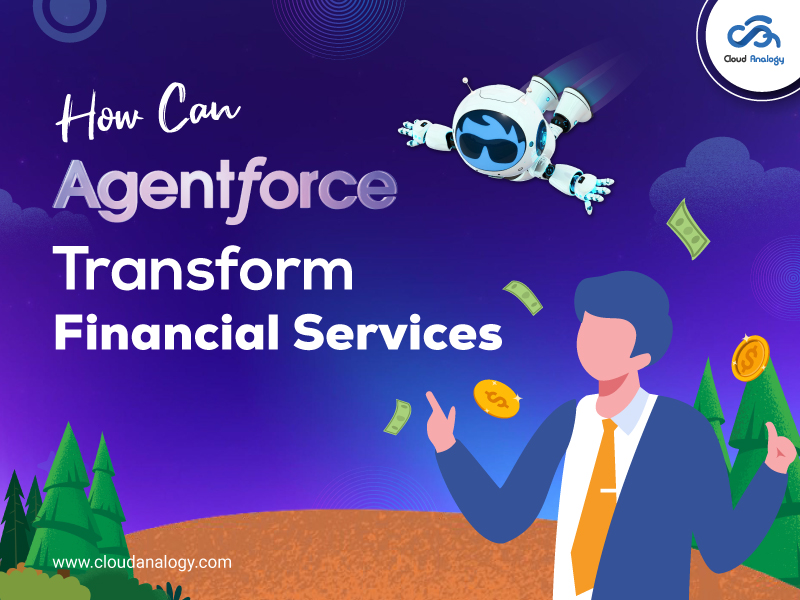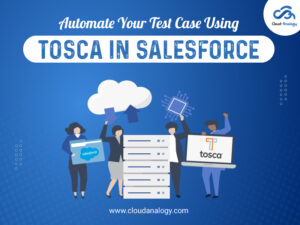Sharing is caring!
In May 2025, Salesforce launched Agentforce for Financial Services to help financial institutions address two key pressures: declining workforce capacity and growing client expectations.
Traditional financial services operations are burdened by administrative overhead; advisors, bankers, and insurance personnel often spend much of their day on routine tasks rather than client engagement. In fact, only 39% of the time is spent on direct client-facing work.
Agentforce for Financial Services introduces a set of pre-built, role-based AI agent templates designed to automate front-office tasks, from meeting prep and follow-up to servicing requests or guiding loan product discovery, all embedded within Salesforce’s Financial Services Cloud.
How does Agentforce for Financial Services work?
Agentforce is not a standalone bot system; it’s deeply integrated into the firm’s existing data, workflows, and compliance rules.
Here are its core components and capabilities:
- Role-based Templates: Pre-built agents tailored to roles such as Financial Advisor, Banker, Insurance Service Agent, or Digital Loan Officer.
- Topics & Actions: Each agent comes with “Topics” (which drive conversational or decision logic) and “Actions” (which let the agent take steps, like creating tasks, sending disclosures, or triggering workflows).
- Embedded Compliance Controls: Agent actions are bound by the same regulatory guardrails as human processes. Approvals, audit trails, disclosures, and escalations are all enforced.
- Native to Financial Services Cloud: Humans and agents operate atop the same platform, making transitions seamless and ensuring a unified source of truth.
- Customization & Expansion: Firms can tailor agents to their processes, policies, and service models, all in a no-code or low-code environment.
What roles can Agentforce support in financial services?
Agentforce’s value comes from role-specific templates. Here’s how they map to common functions:
| Role or Function | What the Agent Can Do | Business Impact |
| Financial Advisor/Banker | Automate meeting preparation, generate agendas, surface key client insights, summarize meetings, and create follow-up tasks | More strategic time for client relationships, improved consistency |
| Banking/Insurance Service | Process fee reversals, cancel a lost credit card, explain coverage options, and guide service interactions | Quicker resolution, fewer manual handoffs, lower call centre load |
| Digital Loan Officer | Guide borrowers through product discovery, gather info, suggest relevant loan options 24*7 | Better conversion, faster application cycles, continuous engagement |
| Insurance Quoting | Use demographics, risk profiles to generate tailored quotes | Streamlined underwriting, faster turnaround, better customer experience |
How does Agentforce maintain compliance and trust?
One of the biggest challenges for AI in regulated sectors is governance. Agentforce addresses this via:
- Embedded Compliance: Framework Agents operate with preconfigured rules for approvals, disclosures, audits, and route exceptions.
- Action Auditing & Logging: Every agent-initiated action is logged in near real-time, enabling traceability.
- Guardrails & Escalations: If a task crosses a certain threshold or falls outside policy, it can be escalated to humans for review.
- Regulatory Alignment: Since Agentforce is built within Financial Services Cloud, all interactions are governed by the same frameworks already in place.
What benefits can institutions expect from Agentforce deployment?
Deploying intelligent agents in financial services can yield multiple advantages:
- Increased capacity for personalization: By offloading routine work, teams can spend more time delivering tailored advice and engagement.
- Operational efficiency: Reduction in handling times, fewer human errors, and consistent execution of processes
- Better conversion and speed: Especially in areas like lending and services, where wait times and friction hamper throughput
- Stronger compliance posture: Automated audit trails and policy enforcement reduce risk
In early customer feedback, organizations have reported metrics like:
- 20% increase in chat deflection (i.e., fewer human interventions)
- Salesforce
- Hundreds of hours saved in routine processing
Financial services firms facing workforce shortages or rising demand will find Agentforce a powerful lever to maintain service levels without hiring at scale.
What is Agentforce 360, and what’s new in this release?
While Agentforce for Financial Services is focused on financial institutions, Agentforce 360 is the broader evolution of that AI agent platform, making agents more deeply woven into the enterprise fabric.
The recent “what’s new” highlights include:
- Agentforce Builder: A new, streamlined tool for building and iterating agents more rapidly
- Agent Script: Provides more fine-grained control over agent behavior and conversational flows
- Agentforce Voice: Enables agents to interact via natural voice conversations aligned with brand tone
- Intelligent Context: Deeper grounding of agents into unstructured data (documents, emails, transcripts) for more context-aware responses
- Humans + Agents + Data: The ethos of Agentforce 360 is to bring together human expertise, AI agents, applications, and data in one seamless experience.
In short, Agentforce 360 is about amplifying agent capabilities, letting organizations deploy agents across more domains, with richer interaction models, and tighter alignment to data.
How do Agentforce and Agentforce 360 complement each other?
You can think of Agentforce (for a specific industry) as a specialized deployment, while Agentforce 360 is the platform evolution that enhances agent capabilities across contexts. Here’s how they interplay:
- Agentforce uses the foundation of Agentforce 360: The features in Agentforce 360 (builder, context, voice) can enrich domain-specific agents.
- Scalability: Once the financial services use case is proven, institutions can expand to other lines (e.g., insurance, wealth, operations) using Agentforce 360 capabilities.
- Unified tooling: Developers, administrators, and domain experts can work in a shared environment, using the same underlying tools and standards.
- Cross-domain intelligence: Agents built in different functions can share learnings, datasets, or logic via the Agentforce 360 backend.
Thus, financial firms get the best of both: a tailored, compliant AI agent solution and access to the next-gen agent platform.
What challenges or considerations should be kept in mind?
No transformative tool is without challenges. Some key points to consider:
- Change management & adoption: Training employees to trust and collaborate with agents is essential
- Data quality & integration: Agents depend heavily on clean, integrated CRM and service data
- Governance & exceptions: Humans must oversee edge cases and define clear escalation paths
- Customization effort: Pre-built templates accelerate deployment, but customizations will need domain expertise
- Monitoring and continuous improvement: Agents should be iteratively tuned based on feedback
How can Cloud Analogy help you leverage Agentforce?
As a Salesforce Summit Consulting Partner with over a decade of innovation in automation and AI integration, Cloud Analogy is uniquely positioned to help financial enterprises adopt Agentforce and Agentforce 360 successfully.
Here’s how Cloud Analogy can accelerate your AI journey:
- Strategic Implementation: From Financial Services Cloud setup to agent customization, Cloud Analogy ensures your AI adoption aligns with business and compliance goals.
- Integration Expertise: Our experts seamlessly connect Agentforce with core banking systems, CRMs, and third-party applications for unified data flow.
- AI and Analytics Enablement: Through platforms like AIonOS, we help businesses extend Agentforce with analytics dashboards, sentiment analysis, and voice intelligence.
- Continuous Optimization: With DevOps and managed services, Cloud Analogy fine-tunes agents’ performance based on evolving needs.
- Change Management & Training: Empower teams through enablement sessions and workshops that drive adoption across departments.
Cloud Analogy has already delivered solutions around Voice AI and Einstein 1 Data Cloud integrations, helping clients reduce manual workload, boost advisor productivity, and enhance service quality.
With a proven record of delivering AI-native Salesforce solutions, Cloud Analogy ensures your transition into the Agentic Enterprise is seamless, secure, and scalable.
Conclusion
The launch of Agentforce for Financial Services and Agentforce 360 represents more than a product release; it’s a shift in how work gets done. Financial institutions are no longer bound by workforce limits; they now operate with 24*7 digital capacity, where agents and humans collaborate intelligently.
Cloud Analogy’s implementation expertise, combined with Salesforce’s cutting-edge AI innovation, sets the stage for a financial ecosystem built on trust, intelligence, and efficiency.
As institutions reimagine advisory, lending, and insurance operations, the focus will no longer be on replacing people but on amplifying their potential. That’s the promise of Agentforce: a future where AI doesn’t just work for you; it works with you.
Frequently Asked Questions (FAQs)
Salesforce consulting services make it easier for financial institutions to use Agentforce effectively. They start by understanding your goals, workflows, and compliance needs. Then they design a clear roadmap for integrating Agentforce into your Salesforce ecosystem.
With proper implementation, firms can automate repetitive work, personalize client engagement, and improve turnaround times. Salesforce consulting services also help track results, optimize agent performance, and scale automation as your business grows.
Top Salesforce consulting firms bring proven expertise, domain knowledge, and certified specialists. They accelerate Agentforce deployment, reduce risk, and ensure scalable Salesforce application development tailored to your organization.
Salesforce consulting companies bridge the gap between technology and business. They make Agentforce not just work, but work intelligently for your teams. Their main goal is to make AI adoption simple, compliant, and scalable.
Many Salesforce consulting companies, like Cloud Analogy, also specialize in training teams to work alongside AI agents confidently. They make sure your employees know how to manage, monitor, and refine the system.
Salesforce consulting partners like Cloud Analogy bring both technical depth and business understanding. They go beyond setup, focusing on long-term success and smooth adoption.
As a Salesforce Summit Partner, Cloud Analogy helps companies design, deploy, and optimize Agentforce. The team ensures every feature of Financial Services Cloud and Agentforce works together seamlessly.
Yes. Agentforce can be easily customized with Salesforce application development. This flexibility is one of its biggest strengths.
With Salesforce’s low-code and no-code tools, businesses can tailor agents, workflows, and compliance rules to fit their exact operations. Developers can extend the platform using Apex, Lightning Components, and custom APIs to connect with other systems.










